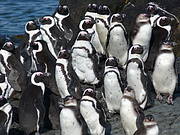South Africa National Committee of IUCN Members
01 August 2012 | Article
The South Africa National Committee of IUCN Members has provided a detailed activity report for 2011. Highlights, in particular of the Committee's contribution to conservation issues and the global agenda, are posted here, and the full report, containing information from the various South African IUCN Members is also available to download.
In keeping with the Constitution of the IUCN National Committee of South Africa, the National Committee met every quarter in 2011. During the meetings, Members gave reports on various activities being carried out as part of their conservation effort to achieve their organizational mandates, mission and objectives in line with the Mission of IUCN. Members also discussed various conservation issues and processes such as:
- The Economics of Ecosystems and Biodiversity (TEEB)
- The preparations for the UNFCC COP 17 in South Africa
- Opportunities for support towards aerial surveys
- Influencing strategy for the Rio+20
The relevance of TEEB to conservation and South Africa
The IUCN Director General attended the meeting and discussed with Members on the groundbreaking study known as TEEB — The Economics of Ecosystems and Biodiversity — initiated in 2008 and supported by a wide range of partners including IUCN. She highlighted that TEEB is a tool to make sure that we value nature. The TEEB report for Business, which was led by IUCN, calls on companies (Coca Cola, Danone etc) to take a lead on greener economy.
The discussion revolved around how IUCN can build on the results of the TEEB study. The Committee committed to familiarize itself with the different themes on TEEB and understand the positives and negatives on greening economy. The Department of Environmental Affairs shared its perspectives on TEEB and its commitment to contextualize TEEB within the realities of Africa. The Committee agreed on a number of issues as follows:
- The need to focus on changing how conservationists speak in addressing the issue of biodiversity. The use of figures alone will not be enough.
- To ensure that African methods of motivating people to conserve are not undermined.
- To focus on targeting local and national government where decisions are made.
- To note the resistance on TEEB by South American countries and agreed to study this further
- To also focus on skills improvement and job creation
- To contextualize the concept and make it works for our country and know how to put value to culture and spirit.
- To speak to the right people by identifying the right target audiences.
The Committee was encouraged to consider developing a local TEEB study that integrates ancient custom and indigenous practices.
UNFCCC COP 17
The National Committee focused on sharing information to ensure adequate preparations and participation during the COP17 in Durban. Government used the National Committee as a platform for reporting progress on the preparations and sharing opportunities for participation. Some of the issues that the Committee was briefed on are:
- The negotiating position of South Africa
- The response white paper of South Africa
- South Africa 2nd National Communication
- Greening and Legacy Projects
- Public Climate Change outreach and mobilization program
The Committee was also notified of all the IUCN activities during the COP17. Members also shared their respective activities during COP17. The National Committee also facilitated the engagement with the International Media during Climate Change CoP17. The International Media visited a project on green cities by BOTSOC in partnership with the Green Building Council.
Influencing Strategy for Rio+20
Members were briefed on the IUCN Influencing Strategy for the Rio+20 focusing on specific themes such as the green economy and improving governance. The Committee committed to ensure that IUCN will articulate the meaning of Green economy as there are many interpretations of this term. The Committee called for engagement with the IUCN taskforce to get guidance on how to engage and move forward to the build-up of Rio +20.
IUCN Governance: Preparations for the IUCN World Conservation Congress
In 2011 the National Committee was the main platform for members to engage with Secretariat on the preparations for the IUCN Congress. South Africa hosted the ESARO Regional Conservation Forum and some National Committee Members such as BOTSOC and DEA contributed to the arrangements of the Forum.
During the discussions on Congress preparations, the National Committee discussed the following aspects:
- Participation at the IUCN Regional Conservation Forum
- Participation at the Members Business Assembly
- Participation at the World Conservation Forum
- Participation in the Motion Process
- Participation in the nomination of candidates for IUCN Council
- Satisfying the requirements for Congress Credentials



